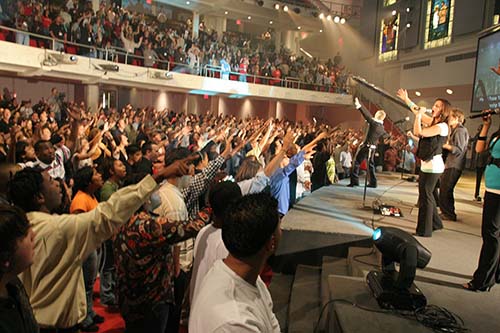As a sociologist of religion and a professor at Biola University, I’m immersed in Christian culture. But it took a two-year research project on new movements in Pentecostal and Charismatic Christianity for me to realize something interesting: Christianity (or at least Protestantism) is becoming Pentecostalized.
Until fairly recently, Biola University, a conservative evangelical college that has its roots in the dispensationalist tradition, has held that the “gifts of the spirit” (including miraculous healing, speaking in tongues, and other “signs and wonders”) were limited to the time period of the original apostles. Yet even at this place that has been historically cool toward the Pentecostal tradition, I see Pentecostalization everywhere.
One of the most energetic and active student groups on Biola’s campus is a neo-Pentecostal student ministry that has healing sessions and high-octane charismatic worship meetings. And as I talk to students who are planning summer mission trips or volunteering during the school year seem more often than not to be working with neo-Pentecostal groups like Youth With a Mission (YWAM), the Los Angeles Dream Center, or the International House of Prayer (IHOP) movement. Â Even Biola’s president was a former member of the Assemblies of God (a classical Pentecostal denomination).Â
A good friend of mine, a pastor in the Uniting Church in Australia (a mainline denomination resulting from a merger of Methodists, Presbyterians, and Congregationalists), recently visited southern California. He described how he has become increasingly involved in “deliverance” ministry, which includes casting out demonic spirits from individuals and homes. The youth pastor at his church, who accompanied him, was reading a book by Bill Johnson, a key figure in the neo-Pentecostal movement. Another friend of mine who lives in Oxford, England, was attending a large Anglican church until he decided that it was getting “too charismatic.” Throughout the Anglophone world, congregations that are growing the fastest are those that have adopted charismatic/Pentecostal practices.
Daniel Walker, who was part of the PCRI research team, tells us that many congregations within the mainline African American denominations, such as African Methodist Episcopal and Missionary Baptist, are increasingly adopting Pentecostal worship styles and practices. In fact, Walker makes the claim that Pentecostal modes of worship are increasingly seen among African American believers as “authentically Black” compared to the more subdued forms associated with the mainline traditions. And among Latino and Asian immigrant congregations in the U.S., the fastest growing are Pentecostal, many of them extensions of networks in their countries of origin. It seems that Pentecostalization is happening across the board.
So what is driving all of this? The pentecostalization of Protestant Christianity could be a result of a combination of factors:
- First, as naturalism and rationalism have loosened their grip on Western culture, a renewed openness and desire for direct encounters with the supernatural seems to have risen, particularly among young people, which may be driving Pentecostalism’s success in the West.
- Second, globalization has brought believers from all over the world into contact with each other through immigration, and through global networks of leaders, conferences, and mission agencies. Many of the practices (such as various techniques for spiritual warfare and “power encounters”) of the neo-Pentecostal movement have spread to the West from non-western leaders and movements, particularly Latin America. Globalization has brought influences to the West from cultures less influenced by naturalism, and more oriented toward the unseen spiritual world.
- Third, in a highly competitive and pluralistic global religious economy, large denominations matter less and networks of charismatic leaders offering the most potent forms of spiritual experience matter more. Those neo-Pentecostal leaders developing the most innovative spiritual practices are independent from oversight by bureaucracies (which tend to squash such practices) and can influence other leaders across denominations through leadership conferences, electronic media, and self-published books, all easily accessible through the Internet.
Whether I am right or not on what is driving all of this, it seems that a transformation is happening across Protestant Christianity. It appears that the 21st century will see a protestant Christianity that is more experimental, less governed by doctrines and large organizations, more driven by charismatic individuals, and more focused on directly encountering the supernatural. Perhaps the Christian faith is returning to its pre-modern roots.
Brad Christerson is a contributing fellow with the Center for Religion and Civic Culture.








